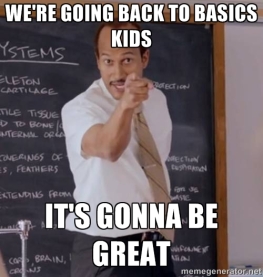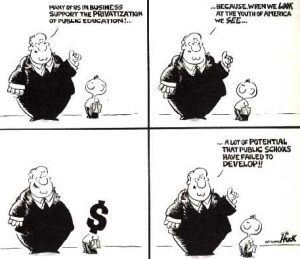Solidarity Halifax member Ben Sichel examines the political dimensions of education debates. Ben is a teacher in Dartmouth and author of the P-12 education section for the Canadian Centre for Policy Alternatives’ Alternative Provincial Budget. Originally published at no need to raise your hand

My local paper recently published a series of articles lamenting Nova Scotian P-12 students’ performance on standardized math and literacy tests. At issue, reported author Frances Willick, is the use of modern teaching techniques such as “whole-language” learning for teaching reading and “discovery-based” learning for teaching math.
Willick’s sources, such as Mount Saint Vincent University (MSVU) education professor Jamie Metsala, say these modern methods have failed kids. Teachers should focus more on traditional techniques like phonics for teaching reading, and repetitive drills for teaching basic math.
All of us should welcome robust public debates on pedagogical techniques, and most of us in the education world do. After all, we want to do the best job we can at educating our kids.
Unfortunately, “crisis” articles like these are not very helpful. First, they sensationalize what is actually happening in our classrooms; and second, they ignore the political context of what is happening in our education system.
Back to Basics?
Let’s look first at the debate on teaching reading, with the caveat that I am not a literacy expert (although high school teachers do still work on literacy skills, directly and indirectly).
Two methods of reading instruction have been used in North American schools over the past several decades. The phonics method consists of teaching letters and syllables as building blocks, which kids learn to “sound out” and use to make words. In contrast, in the whole-language method, the emphasis is on learning whole words and recognizing them in context, analogous to the way children learn to speak.
According to MSVU’s Jamie Metsala, curriculum in Nova Scotia is tilted too far towards whole-language. Metsala says kids need more drilling on simple sounds and syllables in order to make them proficient readers. Phonics instruction is indeed present in classrooms in Nova Scotia, but Metsala says it isn’t enough, and points to standardized test scores which she says show too many students aren’t reading at grade level. (Let’s forget for the time being the question of how much standardized test scores actually tell us about the health of an education system.)
The reading debate isn’t new. This article from 1997 details how heated a political issue it became in California in the early 1990’s, to the point where it influenced a state election.
Willick’s article cites research supporting the conclusion that phonics is the best way to teach literacy. However, plenty of other research on the “Reading Wars” disagrees, saying phonics instruction is no silver bullet. In fact, one of the major reports cited by Willick in support of phonics instruction – the comprehensive (U.S.) National Reading Panel of 2000 – is by no means as unequivocal a defense of phonics as her article presents. For example, it states that phonics instruction “fail[s] to exert a significant impact on the reading performance of low-achieving readers in 2nd through 6th grades.”

A similar, equally protracted debate exists in mathematics education. Recently, “discovery math” came under fire in Alberta from those advocating a “back-to-basics” approach. A parent started a petition demanding that Alberta get rid of its new math approach, claiming that modern teaching methods confuse kids and demanding more drills on things like multiplication tables. Parents even rallied at the provincial legislature. Here in Nova Scotia, Willick reports that some in the world of math education are concerned about Alberta’s curriculum being imported here.
“Back to basics” can be an attractive rallying cry, not least because of its simplicity and appeal to nostalgia. But like many seemingly simple solutions to complex problems, it’s often misguided.
It’s worth noting, first of all, that schools in the real world generally use a combination of traditional and modern teaching techniques. This piece by Jonathan Teghtmeyer of the Alberta Teachers’ Association argues that the so-called math crisis is a fiction, and that old-fashioned drills are still an important strategy used in the math classroom among others. In the wake of the media storm in Alberta several other active classroom teachers also wrote defenses of modern teaching techniques, though by my (non-systematic) observations they didn’t get the same press coverage as the back-to-basics crowd. In response to concerns about discovery-based learning here, the Nova Scotia Department of Education told the the Herald this province would use a “balanced approach between back-to-basics and discovery-style instruction.”
Pedagogy and politics
It’s important to appreciate that these seemingly technical debates have political and philosophical dimensions. To begin to understand how, consider this excerpt from Alberta teacher and writer Joe Bower’s blog on the “math wars”:
“I still remember being taught how to divide fractions in junior high. I was told to flip the second fraction and then multiply. It was a trick that enabled me to get high scores on the tests.
Here’s the problem…
To this day, I have absolutely no idea why I flip the second fraction and multiply. I have no idea what the mathematical reasoning is. I can get the right answer on the test, but there is nothing mathematical about my (lack of) understanding for dividing fractions. If we want to confuse and turn students off of math, I can think of no better strategy than to make math a ventriloquist act where children are merely told the most efficient ways of getting the right answer. This is mindless math mimicry.”
Education debates aren’t just about how we teach; they’re about why we teach what we do. What kind of a society do we hope to create and sustain through our public education system? Is it a better world than the one we live in now? Are people in it happy?
The answers are reflected in the status we assign to certain academic subjects, but also in how we conceive of the acts of teaching and learning themselves. Modern pedagogical methods like discovery-based math and whole-language reading attempt to look beyond simple mechanics of words and mathematical algorithms and answer questions like: why are we teaching this, anyway? What message does the way we do it send to kids? How can we make them enjoy learning?
“Back to basics” is, by and large, a conservative movement: it assumes that the “old way” of doing things worked just fine. It seems to ignore, however, that so many people quite disliked their own school experience precisely because of traditional schooling’s rote-learning, this-is-for-your-own-good-so-suffer-through-it mentality.
Modern pedagogy has attempted (albeit not always successfully) to teach things we think kids need to know, while still helping them foster motivation and desire for learning – arguably an inherent trait in humans.
Looking at who supports the back-to-basics movement is instructive. A good example is the Ontario-based Society for Quality Education (SQE), which counts among its board of directors a range of business-types, a former senior officer of the National Citizens’ Coalition (once directed by Stephen Harper) and no one with any apparent on-the-ground experience in public education. The SQE says public schools have a “bias towards progressivism” and “child-centred learning” (horrors!) and trumpets the Mike Harris government of 1995-2003 as a successful model of school reform. The Society is funded by conservative foundations such as the Atlas Economic Research Foundation, and they recently sponsored Florida governor Jeb Bush’s speech at the Economic Club of Canada.
One “honorary patron” of the SQE is Paul Bennett, a frequent media commentator on educational issues here in Nova Scotia. Bennett, a veteran of elite private schools like Toronto’s Upper Canada College, now works as an educational consultant and regularly authors reports for the Atlantic Institute for Market Studies, the leading right-wing think-tank on Canada’s East Coast. Bennett rails against teacher unions at every opportunity and promotes market-oriented reforms as the solution to perceived educational problems. He and I occasionally debate things on Twitter, and he often uses the word “progressive” as an insult. (For the record, I occasionally agree with things he says.)
Alignment with business interests doesn’t necessarily mean a pedagogical technique is always bad, and just about any teacher (including me) uses them sometimes. But it’s worth looking at how Willick’s stories fit with a narrative common in media reports of public education for some time now. It goes like this: public schools are failing at educating kids. They’re too expensive, and they don’t produce “results” that the job market wants. Therefore, we need to cut “inefficiencies” in the system. And who runs things efficiently? Why, the private sector, of course! The kids in the Chronicle-Herald articles are not getting the attention they need in public school, so they turn to private tutoring companies, which are portrayed as the ones doing things right. To be clear, these companies are doing nothing wrong, but their context is very different to that of a public school – students or parents self-select, and they are not subject to fluctuations in government funding.
This is the same narrative which has led “charter schools” – private schools that receive public money and are not subject to all the same curricular and regulatory constraints as public schools – to “compete” with traditional public schools in many parts of the U.S.

There are, of course, lots of reasons why schools are different from businesses, and the free-market logic pushed by the business crowd is fallacious when it comes to schooling. In the U.S., while some charters seem to perform about as well as traditional public schools in terms of their test scores and graduation rates, many others perform worse. This is despite the fact that most charters can choose which students to admit, meaning public schools are left with disproportionate numbers of high-needs students. Lack of regulatory oversight means that charters have faced controversy on everything from questionable disciplinary practices to high-level corruption.
(As if on cue, this past weekend the Chronicle-Herald published a baseless screed calling for charter schools in this province.)
By no means do public schools get everything right, and we should constantly aim to improve them. But setting up straw men that undermine the very notion of public education helps no one. Society’s expectations of its public education system have changed dramatically in the last century – we know much more about student special needs and mental health issues, and we expect all students to graduate high school, for example – yet we act surprised that costs to education has gone up and that educators seem overworked and unhappy. Improving education goes hand in hand with solving other problems such as economic inequality and systemic racism (and to the Chronicle-Herald’s credit, the final story in its series on Nova Scotia schools examines the very real effects of poverty on student learning).
When we’re told the education system is broken, we should pay attention to who’s telling us, and who stands to benefit from the “fixes.”
Note: Articles published by Solidarity Halifax members do not necessarily reflect positions held by the organization.
Sorry, the comment form is closed at this time.